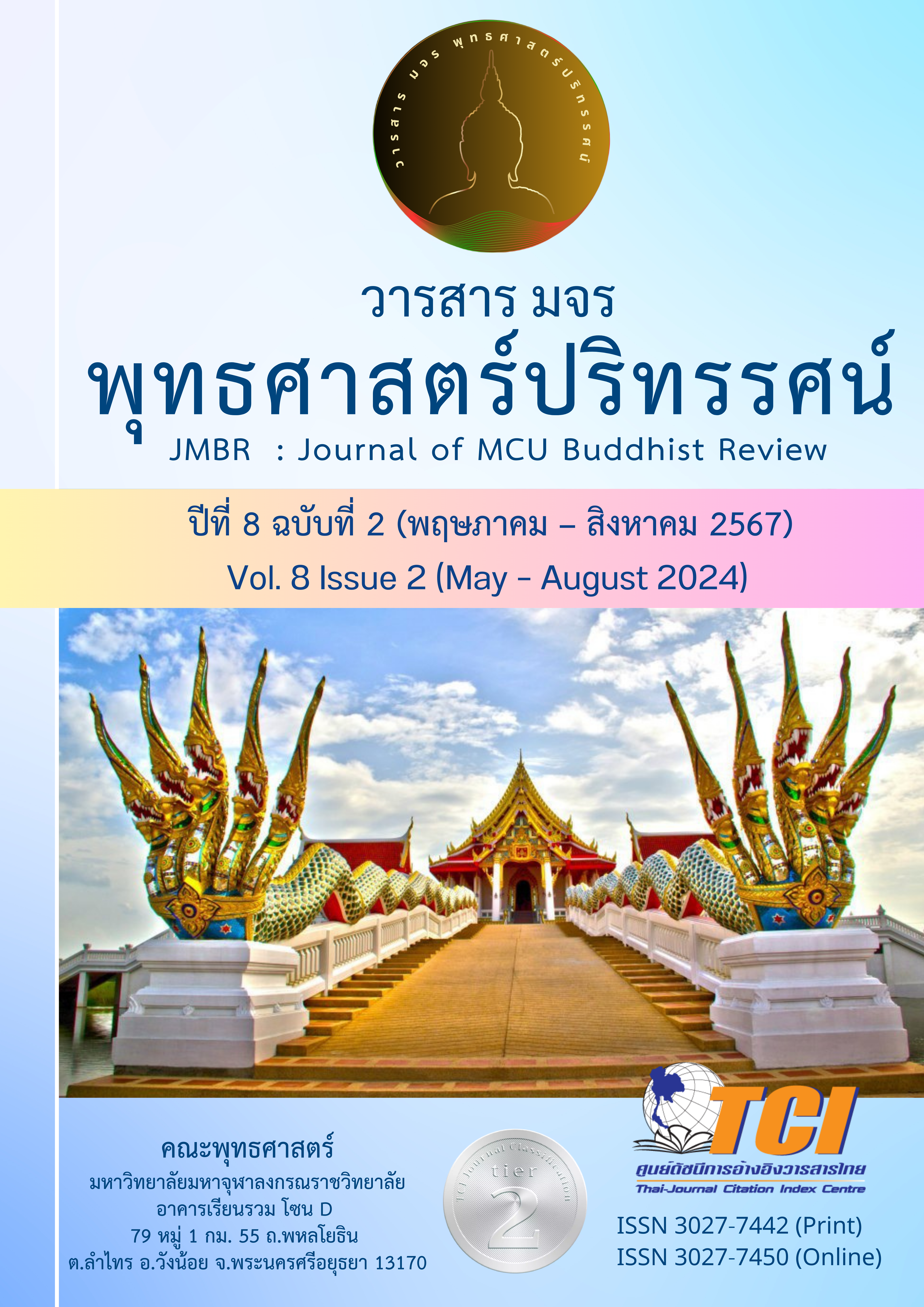ศึกษาวิเคราะห์หลักปฏิสันถารในคัมภีร์พระพุทธศาสนาเถรวาท
Main Article Content
บทคัดย่อ
บทความวิจัยนี้มีวัตถุประสงค์ 1) เพื่อศึกษาหลักปฏิสันถารในคัมภีร์พระพุทธศาสนาเถรวาท 2) เพื่อศึกษาหลักธรรมที่เกี่ยวข้องกับปฏิสันถารในคัมภีร์พระพุทธศาสนาเถรวาท 3) เพื่อวิเคราะห์หลักปฏิสันถารในคัมภีร์พระพุทธศาสนาเถรวาท เป็นงานวิจัยเชิงเอกสารโดยศึกษาจากพระไตรปิฎก อรรถกถา คัมภีร์สำคัญและนำเสนอเชิงพรรณนา
ผลการวิจัยพบว่า 1) ปฏิสันถาร มี 2 อย่าง ได้แก่ (1) อามิสปฏิสันถาร คือการต้อนรับแขกผู้มาเยือนด้วยวัตถุสิ่งของ ประกอบด้วยการนอบน้อมเคารพ กราบไหว้ บูชาด้วยปัจจัย 4 (2) ธัมมปฏิสันถาร คือการต้อนรับด้วยการให้ธรรมะด้วยการสนทนาธรรม ในสมัยพุทธกาล พระพุทธเจ้าและเหล่าพระสาวกพระสาวิกา อุบาสกและอุบาสิกาต่างต้อนรับกันและกันด้วยธัมมปฏิสันถาร 2) ปฏิสันถารมีความสัมพันธ์กับหลักธรรมในคัมภีร์พระพุทธศาสนาเถรวาท ดังนี้ หลักธรรมที่เกี่ยวข้องกับอามิสปฏิสันถาร ได้แก่ พรหมวิหาร 4 สังคหวัตถุ 4 ปริจาคะ พลี 5 ส่วนหลักธรรมที่เกี่ยวข้องกับธัมมปฏิสันถาร ได้แก่ ขันธ์ 5 ธาตุ 6 อนุปุพพิกถา อริยสัจ 4 3) หลักการปฏิสันถาร แบ่งออกเป็น 2 ประการ ได้แก่ (1) หลักอามิสปฏิสันถาร สำหรับสัทธิวิหาริก พึงปฏิบัติต่ออุปัชฌาย์ อันเตวาสิก พึงปรนนิบัติอุปัฏฐากอาจารย์ ภิกษุภิกษุณีปฏิสันถารกับพระราชา ญาติ และแม้กับโจร (2) หลักธัมมปฏิบัติสันถาร ภิกษุภิกษุณีควรให้ธรรมะแก่พุทธบริษัทที่มาเยือน หรือผู้ประสงค์อยากฟังธรรม รวมถึงชี้แนะให้คำปรึกษาแก้ไขปัญหา โดยนำหลักธรรมของพระพุทธเจ้ามาอธิบายประกอบให้เข้ากับเหตุการณ์นั้น
Article Details

อนุญาตภายใต้เงื่อนไข Creative Commons Attribution-NonCommercial-NoDerivatives 4.0 International License.
- บทความที่ได้รับการตีพิมพ์เป็นลิขสิทธิ์ของวารสาร มจร พุทธศาสตร์ปริทรรศน์
- ข้อความใดๆ ที่ปรากฎในบทความที่ได้รับการตีพิมพ์ในวารสาร ถือเป็นความรับผิดชอบของผู้เขียนบทความ และข้อคิดเห็นนั้นไม่ถือว่าเป็นทัศนะและความรับผิดชอบของกองบรรณาธิการวารสาร มจร พุทธศาสตร์ปริทรรศน์
เอกสารอ้างอิง
ชมัยพร มีทวี และพชรเดช เสมานู. (2565). การให้บริการประชาชนตามหลักสังคหวัตถุ 4 ของ สำนักงานช่างรังวัดเอกชนในกำกับกระทรวงมหาดไทย เขตเมืองร้อยเอ็ด จังหวัดร้อยเอ็ด. วารสารรัฐศาสตร์สาส์น. 1(1), 59-72.
พระธรรมกิตติวงศ์ (ทองดี สุรเตโช). (2548). พจนานุกรมเพื่อการศึกษาพุทธศาสน์ ชุดคำวัด. กรุงเทพฯ: สำนักพิมพ์ช่อระกา.
พระธรรมธีรราชมหามุนี (โชดก ญฃาณสิทฺธิ). (2545). มงคล 38 ประการ. พิมพ์ครั้งที่ 9. กรุงเทพฯ: โรงพิมพ์มหาจุฬาลงกรณราชวิทยาลัย.
พระธรรมปิฎก (ป.อ.ปยุตฺโต). (2542). พุทธธรรม ฉบับปรับปรุงและขยายความ. พิมพ์ครั้งที่ 8. กรุงเทพฯ: โรงพิมพ์มหาจุฬาลงกรณราชวิทยาลัย.
พระมหาสุชิน สุชีโว. (2546). การศึกษาวิเคราะห์เรื่องหลักการสงเคราะห์ญาติในพระพุทธศาสนาเถรวาท. วิทยานิพนธ์พุทธศาสตรมหาบัณฑิต บัณฑิตวิทยาลัย: มหาวิทยาลัยมหาจุฬาลงกรณราชวิทยาลัย.
พระมหาอภิพล อภิพโล. (2562). แนวทางการส่งเสริมจิตสำนึกหลักพลีกรรม 5 ในสังคมไทยปัจจุบัน. วารสารสังคมศาสตร์และวัฒนธรรม. 3(1), 1-16.
พระอภิชัย อภิวฑฺฒโน. (2559). การประยุกต์ใช้หลักคารวธรรม เพื่อการเสริมสร้างครอบครัวสันติสุข. วารสารสันติศึกษาปริทรรศน์. 9(2), 174-187.
มหาจุฬาลงกรณราชวิทยาลัย. (2539). พระไตรปิฎกภาษาไทย ฉบับมหาจุฬาลงกรณราชวิทยาลัย. กรุงเทพฯ: โรงพิมพ์มหาจุฬาลงกรณราชวิทยาลัย.
มหาจุฬาลงกรณราชวิทยาลัย. (2556). อรรถกถาภาษาไทย ฉบับมหาวิทยาลัยมหาจุฬาลงกรณราชวิทยาลัย. กรุงเทพฯ: โรงพิมพ์มหาจุฬาลงกรณราชวิทยาลัย.
วรรธิดา สงขาว และพระมหาหรรษา ธมฺมหาโส. (2563). กระบวนการให้คำปรึกษาของนักโหราศาสตร์ในสมาคมโหราศาสตร์นานาชาติ ด้วยหลักพุทธสันติวิธี. วารสารสันติศึกษาปริทรรศน์. 8(4), 1539-1551.
สมเด็จพระมหาสมณเจ้า กรมพระยาวชิรญาณวโรรส. (2556). วินัยมุขเล่ม 3. พิมพ์ครั้งที่ 33. นครปฐม: โรงพิมพ์มหามกุฏราชวิทยาลัย.
สฤษฏ์เทพ สุขแก้ว. (2561). สมรรถนะในการปฏิบัติงานต้อนรับส่วนหน้าของนักศึกษาระดับอุดมศึกษา สาขาวิชาการโรงแรม. วารสารวิทยาลัยดุสิตธานี. 12(2), 1-19.
สานุ มหัทธนาดุล และสริตา มหัทธนาดุลย์. (2562). การเสริมสร้างสุขภาวะองค์รวมเพื่อวิถีชีวิตที่สมดุลตามแนวพุทธจิตวิทยา. วารสารมหาจุฬานาครทรรศน์. 6(3), 1161-1172.
สานุ มหัทธนาดุล. (2561). ศีลห้า: เกณฑ์ชี้วัดและการเสริมสร้างสันติสุขของบุคคลและสังคม. วารสาร มจร สังคมศาสตร์ปริทรรศน์. 7(2), 605-616.
อนุรักษ์ สาแก้ว. (2560). การพัฒนารูปแบบพฤติกรรมเชิงพุทธของครอบครัวในสังคมไทย. วารสารวิทยาลัยสงฆ์นครลำปาง. 6(2), 73-84.


